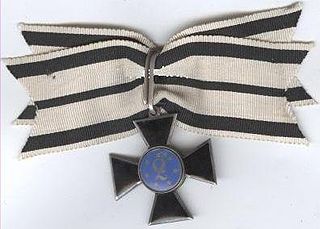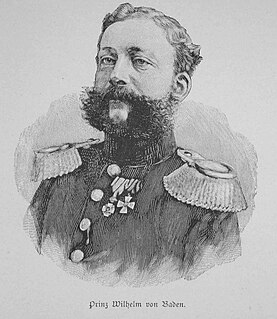
Albert was the King of Saxony and a member of the House of Wettin.

William I or Wilhelm I of the House of Hohenzollern was King of Prussia from 2 January 1861 and the first German Emperor from 18 January 1871 to his death. William was the first head of state of a united Germany, and was also de facto head of state of Prussia from 1858 to 1861, serving as regent for his brother, Frederick William IV.

Frederick William III was king of Prussia from 1797 to 1840. He ruled Prussia during the difficult times of the Napoleonic Wars. Steering a careful course between France and her enemies, after a major military defeat in 1806, he was humiliated by Napoleon, and Prussia was stripped of recent gains and forced to pay huge financial penalties. The king reluctantly joined the coalition against Napoleon in the Befreiungskriege. Following Napoleon's defeat, he took part in the Congress of Vienna, which assembled to settle the political questions arising from the new, post-Napoleonic order in Europe. His major interests were internal, the reform of Prussia's Protestant churches. He was determined to unify the Protestant churches, to homogenize their liturgy, their organization, and even their architecture. The long-term goal was to have fully centralized royal control of all the Protestant churches in the Prussian Union of Churches. The king was said to be extremely shy and indecisive. His wife Queen Louise (1776–1810) was his most important political advisor. She led a very powerful group that included Baron vom Stein, Prince von Hardenberg, von Scharnhorst, and Count Gneisenau. They set about reforming Prussia's administration, churches, finance and military.

The Pour le Mérite is an order of merit established in 1740 by King Frederick II of Prussia. The Pour le Mérite was awarded as both a military and civil honour and ranked, along with the Order of the Black Eagle, the Order of the Red Eagle and the House Order of Hohenzollern, among the highest orders of merit in the Kingdom of Prussia. After 1871, when the various German kingdoms, grand duchies, duchies, principalities and Hanseatic city states had come together under Prussian leadership to form the federally structured German Empire, the Prussian honours gradually assumed, at least in public perception, the status of honours of Imperial Germany, even though many honours of the various German states continued to be awarded.

Louis IV was the Grand Duke of Hesse and by Rhine, reigning from 13 June 1877 until his death. Through his own and his children's marriages he was connected to the British Royal Family, to the Imperial House of Russia and to other reigning dynasties of Europe.

George V was the last King of Hanover, the only child and successor of King Ernest Augustus. George V's reign ended during the unification of Germany.

Prince Friedrich Karl of Prussia was the son of Prince Charles of Prussia (1801–1883) and his wife, Princess Marie of Saxe-Weimar-Eisenach (1808–1877). Prince Friedrich Karl was a grandson of King Frederick William III of Prussia and a nephew of Frederick William IV and William I. He was born in Berlin at the Royal Palace.

Prince Albert of Prussia was a Prussian general field marshal, Herrenmeister of the Order of Saint John from 1883 until his death, and regent of the Duchy of Brunswick from 1885, also until his death.

The Order of the Black Eagle was the highest order of chivalry in the Kingdom of Prussia. The order was founded on 17 January 1701 by Elector Friedrich III of Brandenburg. In his Dutch exile after World War I, deposed Emperor Wilhelm II continued to award the order to his family. He made his second wife, Princess Hermine Reuss of Greiz, a Lady in the Order of the Black Eagle.

Prince Alexander Ludwig Georg Friedrich Emil of Hesse, GCB, was the third son and fourth child of Louis II, Grand Duke of Hesse, and Wilhelmina of Baden. He was a brother of Tsarina Maria Alexandrovna, wife of Tsar Alexander II. The Battenberg / Mountbatten family descends from Alexander and his wife Countess Julia von Hauke, a former lady-in-waiting to his sister.

Prince Frederick Henry Albert of Prussia was the fifth son and youngest child of King Frederick William III of Prussia and Louise of Mecklenburg-Strelitz. His parents had fled to East Prussia after the occupation of Berlin by Napoleon, and Albert was born in Königsberg. Two of Albert's elder brothers were Frederick William IV, King of Prussia from 1840 till 1861, and William I, King of Prussia from 1861 to 1888 and German Emperor from 1871 until 1888.

Prince Frederick Charles Alexander of Prussia was a younger son of Frederick William III of Prussia. He served as a Prussian general for much of his adult life and became the first Herrenmeister of the Order of Saint John after its restoration as a chivalric order. Nevertheless, he is perhaps remembered more often for his patronage of art and for his sizable collections of art and armor.

Frederick Francis II was a Prussian officer and Grand Duke of Mecklenburg-Schwerin from 7 March 1842 until 15 April 1883.

Frederick William was a German sovereign who ruled over the state of Mecklenburg-Strelitz as Grand Duke from 1860 until his death.

The Wilhelm-Orden was instituted on 18 January 1896 by the German Emperor and King of Prussia Willhelm II as a high civilian award, and was dedicated to the memory of his grandfather Emperor William I "the Great".

Frederick William George Adolphus, Landgrave of Hesse was the only son of Wilhelm I, Landgrave of Hesse-Kassel-Rumpenheim and Princess Louise Charlotte of Denmark.

Joachim Karl Wilhelm Friedrich Leopold Prinz von Preußen was a son of Prince Frederick Charles of Prussia and Princess Maria Anna of Anhalt-Dessau, married in 1854.

The Order of Louise was founded on 3 August 1814 by Frederick William III of Prussia to honor his late wife, the much beloved Queen Louise. This order was chivalric in nature, but was intended strictly for women whose service to Prussia was worthy of such high national recognition. Its dame companion members were limited to 100 in number, and were intended to be drawn from all classes.

Frederick William I was, between 1847 and 1866, the last Prince-elector of Hesse-Kassel.

Prince Louis William Augustus of Baden was a Prussian general and politician. He was the father of Prince Maximilian of Baden, the last Minister President of the Kingdom of Prussia and last Chancellor of the German Empire. Wilhelm was a Prince of Baden, and a member of the House of Zähringen.





















